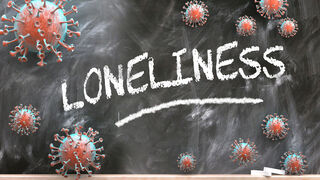Loneliness
Combating the Pandemic of Loneliness
The deeper meaning of kindness, compassion, and friendship.
Posted August 9, 2022 Reviewed by Lybi Ma
Key points
- Every interaction is an opportunity to strengthen or weaken connections with others.
- Be kind, show compassion, and practice your friendship skills both with people you know and with strangers.
- It is important to have relationships that allow you to disclose your authentic self especially during difficult times.

The last two years have been especially difficult for many people around the world. The direct and indirect effects of the coronavirus pandemic and response, including collateral damage, are still unclear. Complicating the process of completing an assessment, the World Health Organization, WHO, has advised that this global public health challenge is not yet over.1 Moreover, it is unknown exactly when it will end.
What is clear is that COVID-19 has taken—and continues to take—a heavy toll. For instance, it has been reported that the pandemic has exacerbated the risk factors associated with suicidal ideation and behavior, as well as increased the prevalence of depressive and anxiety disorders.2
Lockdowns, social and economic disruptions, and sharp increases in unemployment have been some of the contributors that aggravated an already serious public health threat. In turn, the consequences stemming from them were compounded by a damaging societal climate marked by increases in social isolation, fear, domestic conflicts, financial or job losses, and other serious biopsychosocial risk factors. There is also evidence indicating aggravation of pre-existing mental health conditions, drug abuse or overdose, and diseases or deaths of despair since the beginning of the pandemic.3
The challenges experienced in recent years have created a perfect storm of extreme stress and collective trauma for entire populations, leaving very few people untouched or unscathed by its reach. Most worrisome is the fading of hope and the inducing of a sense of despair among people who have been adversely affected. Moreover, the prevalence of loneliness, which is associated with despair, likely was exacerbated by the social distancing and isolation practices put in place. It should not come as a surprise that loneliness has even been described as a “pandemic” in its own right.4
Against this backdrop, humanity needs to find a remedy for dealing with potential pandemic-induced psychological impacts, such as loneliness and despair. Good intentions notwithstanding, it is ill-advised to rely solely on medical specialists and other professional healthcare providers to confront the psychological and emotional impacts, alongside the physical effects, of the pandemic on their patients’ well-being. Adopting a screening protocol for loneliness by primary care physicians and allied clinicians, to be sure, can identify a patient in need of further consultation and intervention. Still, there are other ways to address loneliness at an earlier stage that can meaningfully engage the broader community of stakeholders in the process of reversing the fading of hope in the face of what appears to be inescapable suffering.
It is more important now than ever for human beings to practice kindness and reach out to others in acts of compassion and friendship. As the ancient Greek storyteller Aesop wisely advised in his fables, “No act of kindness, no matter how small, is ever wasted.” Kindness is an act when trying to help others; it is closely related to another important human attribute, compassion, which is the ability to feel for another's suffering. Taken together, these qualities provide a platform for connecting with and supporting others in ways that can help to counteract the fading of hope and, in turn, uplift the human spirit.5
Most readers will agree that difficult times show us who our true friends are. The confidence that someone will be there for us, spiritually and emotionally if not in person, during such times is grounding and helps us navigate through the fog of life’s many obstacles. In this regard, the ancient Greek philosopher Aristotle wrote extensively about the notion and importance of true friendship as a determinant of “meaningful” living. His view stands in sharp contrast to the role of friendship in today’s socially networked world.
“What is a friend? A single soul dwelling in two bodies.”—Aristotle
In this connection, what do you think Aristotle would have to say about the meaning of—and the path to—friendship that has come to popularize the new millennium? Have we perhaps gone too far in our quest for connection with others in a world that has become increasingly disconnected and lonely, even before COVID-19 entered?
The search for meaning is the primary, intrinsic motivation of human beings and is a megatrend of the 21st century.6 From a meaning-centric perspective, where does friendship fit in? How might friendship help to reduce the prevalence of loneliness and despair that are now associated with the pandemic?
To be sure, there are more questions than answers, although there are some trends worthy of mention. For example, I recall an article in USA Today about a decade before the pandemic that addressed social media’s influence on friendship. It concluded, “Just as our daily lives are becoming more technologically connected, we’re losing other, more meaningful relationships. Yes, we’re losing our friends.”7
The joys of real human contact are being replaced by electronic stimuli and shallow “social connections” rather than the kind of true friendships described and espoused by Aristotle. There is evidence that while we have plenty of acquaintances, more and more of us have few individuals to whom we can turn and share our authentic selves, our deep intimacies, let alone have confidence that they will be there to support us in our time of need.
In his classic work Ethics, Aristotle offered the following ageless wisdom: “The desire for friendship comes quickly. Friendship does not.” It takes time and effort to build true friendships, relationships through which you are able and willing to disclose your authentic self—innermost thoughts, intimate feelings, sensitive vulnerabilities, and secret fears.
In today’s pandemic-driven world, many people seem to have drifted away from true friendships and a sense of “community” and, either by choice or out of necessity, are living lonely lives. It’s time to resurrect the meaning and value of authentic relationships with others through acts of kindness, compassion, and friendship. It’s time to begin the process by extending beyond ourselves and connecting meaningfully with others, especially those who are lonely and may have lost hope in themselves and humanity.
References
1. “’COVID-19 is not over,’” Tedros warns World Health Assembly. United Nations.
2. John A., et al. (2020). “The impact of the COVID-19 pandemic on self-harm and suicidal behaviour: update of living systematic review.” F1000Research. 2020 September 4; 9:1097.
Santomauro, D., et al. (2021), “Global prevalence and burden of depressive and anxiety disorders in 204 countries and territories in 2020 due to the COVID-19 pandemic.” The Lancet. 2021 November 6; 398 (10312):1700-1712.
Pirkis, J., et al. (2021), “Suicide trends in the early months of the COVID-19 pandemic: interrupted time series analysis of preliminary data from 21 countries.” The Lancet Psychiatry, 8(7), pp. 579-588.
3. For example, see: Impact of the COVID-19 pandemic on suicidal attempts and death rates: a systematic review. BMC Psychiatry
4. Lonergan-Cullum, M., et al. (2022), “A New Pandemic of Loneliness,” The Journal of the American Board of Family Medicine, May 2022, Vol. 35 (3), pp. 593-596
5. For more insights into the topics of kindness and compassion, see: Pattakos, A. and Dundon, E. (2015). The OPA! Way: Finding Joy & Meaning in Everyday Life & Work. Dallas: BenBella Books, Chapters 4 and 5.
6. Frankl, V.E. (1992). Man’s Search for Meaning: An Introduction to Logotherapy, 4th edition. Boston: Beacon Press, p. 105; Pattakos, A. and Dundon, E. (2017). Prisoners of Our Thoughts: Viktor Frankl’s Principles for Discovering Meaning in Life and Work, 3rd edition. Oakland: Berrett-Koehler Publishers, p. 175.
7. Vernon, M. (2010). “Is true friendship dying away?” USA Today, July 27, p. 11A.




